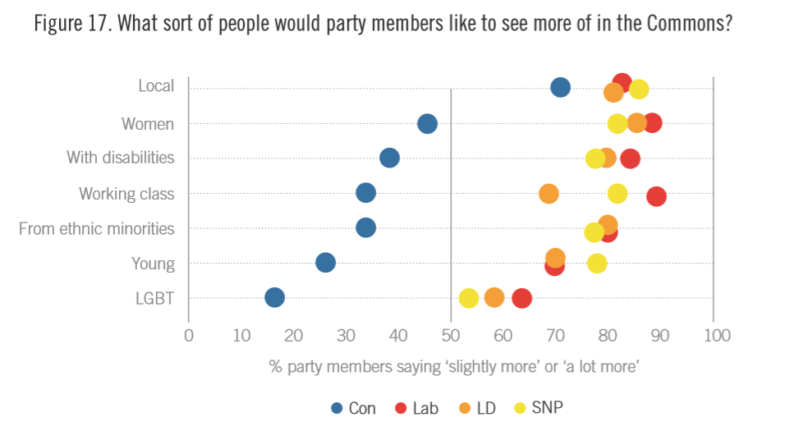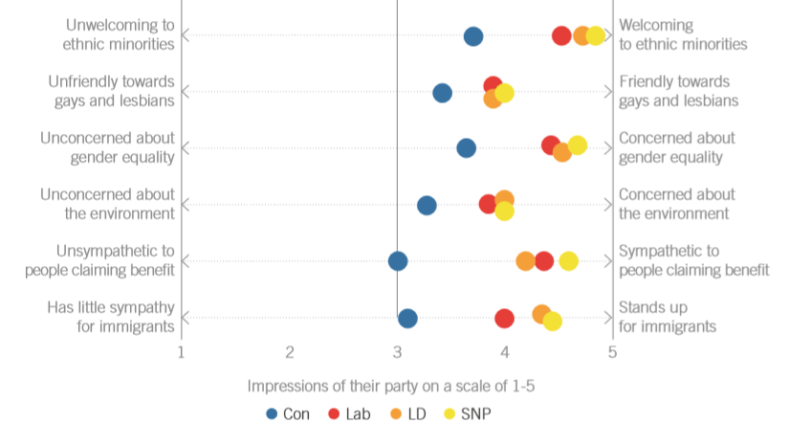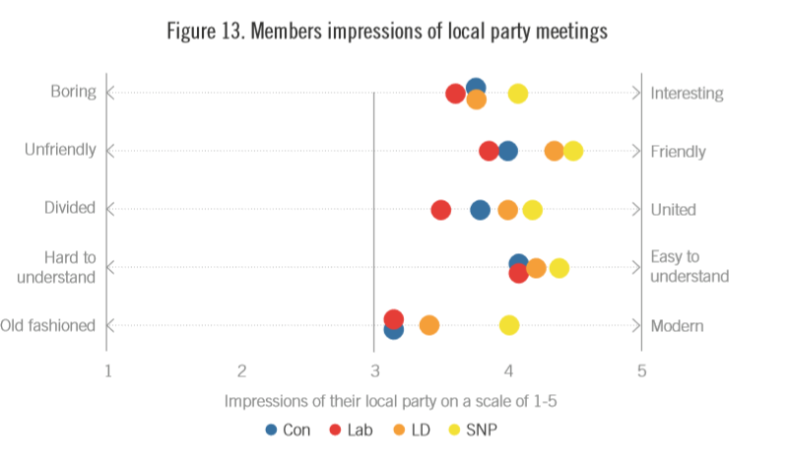Strong support from Liberal Democrat members for a more diverse House of Commons
Interesting data from the latest research into party members by the Party Members Project at Queen Mary University of London: there’s very strong support amongst Liberal Democrat members for a more diverse House of Commons:
 The question, of course, this prompts is whether members are also willing to support effective measures to bring this about. The party’s record so far – not only in 2017 or 2015 but also across all the MPs the party has ever elected – is far from achieving this ideal.
The question, of course, this prompts is whether members are also willing to support effective measures to bring this about. The party’s record so far – not only in 2017 or 2015 but also across all the MPs the party has ever elected – is far from achieving this ideal.
Which rather suggests the party can’t simply do what it used to do if it wants to make progress. Especially as, when taken, vigorous measures have been rather successful and ended up widely accepted.
Moreover, if we really want the best people for the job, both as our candidates and MPs, then unless you happen to believe that the best person is overwhelmingly from the minority that is like me (white, middle class, male, etc.) the results show we’re clearly failing to get the best person.
One related curio from the data is what members think about how welcoming, or not, the party is to members of different groups:
 Is that really high figure for ‘welcoming to ethnic minorities’ a reflection of reality for ethnic minorities or a touch of self-delusion by others? The latter, I fear, given what both ethnic minority Liberal Democrats have often said to me and others in the past and also what different party reviews have found over the years. (It would also fit with the classic pattern of those who would not be on the receiving end of discrimination thinking it is much less of an issue than those who would be.)
Is that really high figure for ‘welcoming to ethnic minorities’ a reflection of reality for ethnic minorities or a touch of self-delusion by others? The latter, I fear, given what both ethnic minority Liberal Democrats have often said to me and others in the past and also what different party reviews have found over the years. (It would also fit with the classic pattern of those who would not be on the receiving end of discrimination thinking it is much less of an issue than those who would be.)
Being better at being more welcoming to a range of groups is, the evidence suggests, something the party needs to work at rather than rest on supposed laurels over.
The relatively low figure for gays and lesbians is, I guess, connected with the controversies over Tim Farron’s religious views.
Finally, on a different point – watch out for how modern, or not, any meetings you’re involved with organising are:

With thanks to Tim Bale for providing me with the research results and graphics used in this post.
Details of the research
The ESRC Party Members Project (PMP) is a three-year project run by Tim Bale, Paul Webb and Monica Poletti and funded by the Economic and Social Research Council (ESRC). It aims to study party membership in the six largest British parties: The Conservatives, Labour, the Liberal Democrats, the SNP, UKIP, and the Greens.
By collecting original quantitative and qualitative data, the project explores party membership’s supply side (the members themselves and what they do and think) and its demand side (how and what parties think of their membership and their recruitment and retention strategies).
One week after the June 2017 UK’s General Election, researchers from the Party Members Project conducted an online survey of members of the Conservative Party, the Labour Party, the Liberal Democrats and the SNP. YouGov recruited the survey respondents from a panel of around 300,000 volunteers who are rewarded for completing a survey. Upon joining the YouGov panel, volunteers complete a survey asking a range of demographic questions, which are subsequently used to recruit respondents matching desired demographic quotas for surveys.
Potential respondents for the party member survey were identified from questions asking respondents if they were members of any of a list of large membership organisations, including the political parties. Some of the respondents surveyed in June 2017 had already been surveyed for the Party Members Project in May 2015, in the aftermath of the General Election or, in the case of the Labour party, in May 2016 as well, in the aftermath of the local elections.
Our attitude to “more working class MMembers in the House of Commons” is very telling.